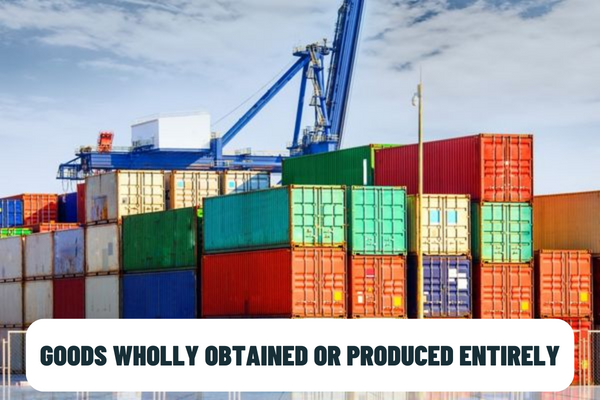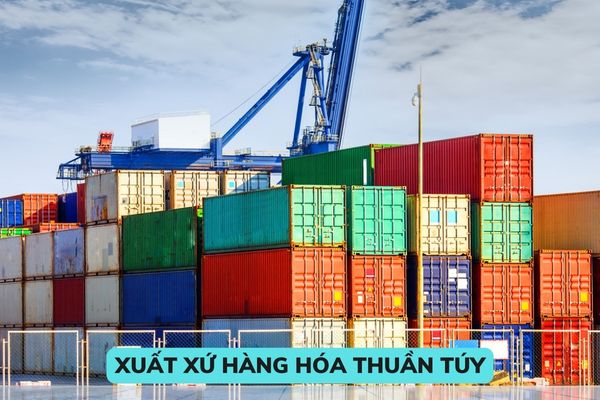What goods are considered as goods wholly obtained or produced entirely in the ASEAN-Japan Comprehensive Economic Partnership Agreement in Vietnam?
- What goods are considered as goods wholly obtained or produced entirely in the ASEAN-Japan Comprehensive Economic Partnership Agreement in Vietnam?
- What goods are considered as goods not wholly obtained or produced in the ASEAN-Japan Comprehensive Economic Partnership Agreement in Vietnam?
- How is the origin of goods considered to be from a party in the ASEAN-Japan Comprehensive Economic Partnership Agreement in Vietnam?
What goods are considered as goods wholly obtained or produced entirely in the ASEAN-Japan Comprehensive Economic Partnership Agreement in Vietnam?
Article 6 of Circular No. 37/2022/TT-BCT stipulates that goods are considered as goods wholly obtained or produced entirely in a Party in the ASEAN-Japan Comprehensive Economic Partnership Agreement in the following cases:
- Plants and plant products grown and harvested, picked or gathered in the Party. “plant” refers to all plant life, including fruit, flowers, vegetables, trees, seaweed, fungi and live plants.
- Live animals born and raised the Party. “animals” defined in this Clause and Clause 3 of this Article covers all animal life, including mammals, birds, fish, crustaceans, molluscs, reptiles, bacteria and viruses.
- Goods obtained from live animals in the Party.
- Goods obtained from hunting, trapping, fishing, gathering or capturing conducted in the Party.
- Minerals and other naturally occurring substances, not included in Clauses 1 through 4 of this Article, extracted or taken from soil, waters, seabed or beneath the seabed of the Party.
- Goods taken from the waters, seabed or beneath the seabed outside the territorial waters of the Party, provided that the Party has the rights to exploit such waters, seabed and beneath the seabed in accordance with its laws and regulations and international law. Nothing in this Agreement shall affect the rights and obligations of the Parties under international law, including those under the United Nations Convention on the Law of the Sea.
- Goods of sea-fishing and other marine products taken by vessels of the Party from outside the territorial sea of any Party.
- Goods processed and/or made on board factory ships of the Party exclusively from products referred to in Clause 7 of this Article.
- Articles collected in the Party which can no longer perform their original purpose or be restored or repaired, and are fit only for disposal, for the recovery of parts or raw materials, or for recycling purposes.
- Scrap and waste derived from manufacturing or processing operations, including mining, agriculture, construction, refining, incineration and sewage treatment operations, or from consumption, in the Party, and fit only for disposal or for the recovery of raw materials.
- Goods obtained or produced in the Party exclusively from goods referred to in Clauses 1 through 10 of this Article.

What goods are considered as goods wholly obtained or produced entirely in the ASEAN-Japan Comprehensive Economic Partnership Agreement in Vietnam? (Image from the Internet)
What goods are considered as goods not wholly obtained or produced in the ASEAN-Japan Comprehensive Economic Partnership Agreement in Vietnam?
In Article 7 of Circular No. 37/2022/TT-BCT stipulating that goods are considered as goods not wholly obtained or produced in a member country in the ASEAN-Japan Comprehensive Economic Partnership Agreement in the following cases:
- The good has a regional value content (RVC), calculated using the formula set out in Article 8 of this Circular, of not less than 40%, and the final process of production has been performed in the Party.
- All non-originating materials used in the production of the good have undergone in the Party a change in tariff classification (CTC) at the 4-digit level (i.e. a change in tariff heading) of the Harmonized Commodity Description and Coding System.
Each Party shall permit the exporter of the good to decide whether to use Point a or b Clause 1 of this Article when determining whether the good qualifies as an originating good of the Party.
How is the origin of goods considered to be from a party in the ASEAN-Japan Comprehensive Economic Partnership Agreement in Vietnam?
In Article 5 of Circular No. 37/2022/TT-BCT on the rules of originating goods of a party in the ASEAN-Japan Comprehensive Economic Partnership Agreement as follows:
Originating goods
A good shall qualify as an originating good of a Party if it:
1. Is wholly obtained or produced entirely in the Party as provided for in Article 6 of this Circular.
2. Satisfies the requirements of Article 7 of this Circular when using non-originating materials.
3. Is produced entirely in the Party exclusively from originating materials of one or more of the Parties.
Thus, a good shall qualify as an originating good of a Party in the ASEAN-Japan Comprehensive Economic Partnership Agreement if it:
- Is wholly obtained or produced entirely in the Party as provided for in Article 6 of this Circular.
- Is produced entirely in the Party exclusively from originating materials of one or more of the Parties.
Circular No. 37/2022/TT-BCT takes effect from March 1, 2023.
LawNet
